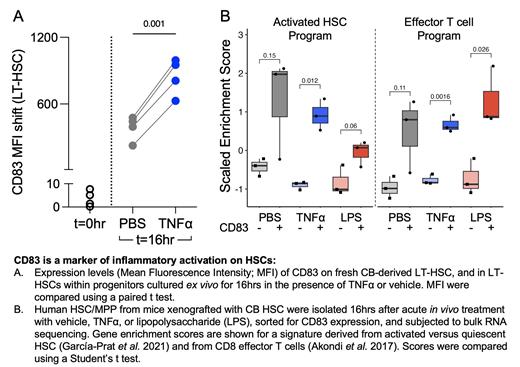Hematopoietic stem cells (HSC) are responsible for life-long blood production and must balance homeostasis with sudden demand situations such as infections. However, the heterogeneity of molecular programs engaged by acute inflammatory stimuli to activate emergency hematopoiesis at the level of HSC are poorly understood. In a recent study linking human HSC heterogeneity to aging, recovery from severe COVID-19 infection, and clonal hematopoiesis (CH), we discovered two HSC subsets through multiomic analysis, denoted HSC-I and -II, in a xenograft model of inflammation-recovery. While HSC-I had few inflammation-driven molecular changes, HSC-II showed sustained epigenetic and transcriptional alterations in response to dual tumor necrosis factor α (TNFα) or lipopolysaccharide (LPS) challenges despite a 2.5-month recovery period. Importantly, a signature of long-term memory T cells (Akondy et al 2017) was enriched in HSC-II (Zeng, Nagree, et al, in submission).
We interrogated the human HSC multiomic signatures uncovered from this human xenograft model to identify potential regulators associated with HSC response to and recovery from acute inflammation. We identified CD83 as a candidate that is differentially expressed between our HSC subsets. Similarly, we found CD83 expression to be enriched in a subset of adult-derived HSCs from patients where CH status was established and enrichment of an HSC-II signature observed (Jakobsen et al, submitted). CD83, first identified as a dendritic cell marker, is expressed on many immune cells, with linkage to controlling murine T regulatory (T-Reg) vs memory cell fate (Doebbeler et al, 2018), but has not previously been shown to be relevant for human HSC biology.
Flow cytometry analysis of cord blood (CB) hematopoietic stem and progenitor cells (HSPC) showed CD83 to be low or absent in HSC (Figure A) and their downstream progeny at steady state. However, robust CD83 expression was observed in multiple HSPC subpopulations including long-term (LT-) and short-term (ST-) HSC within 16 hours of ex vivo culture, with highest expression in LT-HSC (Figure A). Importantly, CD83 surface expression on LT-HSC was enhanced following culture with TNFα (Figure A). Bystander effects were excluded by demonstrating similar findings after culture of purified HSC populations. Acute in vivo LPS treatment of mice xenografted with CB-derived HSC was sufficient to upregulate CD83 surface expression after 16 hours on LT-HSC/HSPC. To elucidate the potential function of CD83-expressing HSC/multipotent progenitors (MPP), CD19-CD34+CD38-CD45RA- cells were sorted from xenografts following acute inflammatory challenge for low and high CD83 expression and subjected to bulk RNA sequencing. We found enrichment of a gene expression signature specific to activated human HSCs (Garcia-Prat et al, 2021) within CD83-positive HSC/MPP (Figure B). Strikingly, enrichment of a signature of stimulated vs resting T cells (Galetti et al, 2020) and of effector T cells (Akondy et al 2017) was found in CD83-positive compared to CD83-negative HSC/MPP (Figure B).
T cell effector function is in part dictated by metabolic reprogramming. We thus examined reactive oxygen species (ROS) levels in LT-HSC following ex vivo culture with TNFα and found lower ROS levels with CD83 expression. We therefore hypothesize that CD83 may be an ‘effector’ marker defining a distinct HSC subset during homeostatic or inflammatory activation that is subsequently fated to become memory-like HSC-II. We are undertaking studies to determine the mechanistic role of CD83 in HSC function and HSC-II formation via Cas9-sgRNA-mediated knockout or lentivirus-mediated overexpression of CD83.
In summary, CD83 represents a long-sought marker of inflammatory activation at the HSC level. CD83 may have significant clinical potential as a biomarker of aberrant activation in gene therapy manufacturing protocols or for HSC transplantation. Future studies will shed light on whether CD83 can functionally regulate the molecular programs underlying human HSC heterogeneity.
Disclosures
Dick:Trillium Therapeutics Inc/Pfi: Patents & Royalties; Graphite Bio: Consultancy, Membership on an entity's Board of Directors or advisory committees; Celgene/BMS: Research Funding.


This feature is available to Subscribers Only
Sign In or Create an Account Close Modal